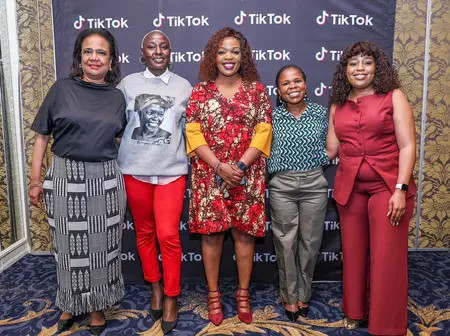By Victoria Musimbi
Nairobi, Kenya: For female journalists in Kenya, the keyboard has become a weapon. The screen, a shield for their attackers. An alarming surge of technology-facilitated gender-based violence (TFGBV) is forcing women in media to fight a war on two fronts: for the story, and for their own safety and dignity.
In a powerful move to turn the tide, the Center for Analytics and Behavioural Change (CABC) partnered with TikTok to convene a critical workshop in Nairobi. The mission? To unite journalists, editors, civil society leaders, and policymakers and forge a new defense for the digital safety of women who bring us the news.
Across Kenya, the digital space has turned toxic. What should be professional discourse often devolves into vicious personal attacks targeting a woman’s credibility, appearance, and family. With over 60% of female journalists in Kenya reporting online harassment, this isn’t just a personal crisis—it’s a direct assault on press freedom and democracy.
“The online abuse is demeaning and exhausting,” shared Zubeidah Kananu, President of the Kenya Editors’ Guild, who has faced everything from character assassination to real-life threats. “When criticism shifts from your journalism to your gender, the goal is to silence you. And silencing women in media means silencing half the story.”
Fighting Algorithms with Action
The workshop moved beyond just highlighting the problem, focusing on data-driven solutions.
“Addressing TFGBV demands deep listening and collaboration,” said Kim Thipe, Executive Director of CABC. “We’re merging the lived experiences of women in media with research-backed strategies to co-create safer digital environments.”
This local focus is key. CABC’s Research Lead, Kyle Janse, explained, “Our data leverages input from Kenyans dealing with harmful content daily, helping us better identify and stop gender-based hate speech.”
Representing TikTok, Duduzile Mkhize, Outreach & Partnerships Manager for Sub-Saharan Africa, emphasized the platform’s commitment to learning from its community: “To understand our users, we must understand their world. The Kenyan media’s input is invaluable in our mission to keep TikTok a safe and creative space for everyone.”
The call for action was clear and urgent. Queenter Mbori, Executive Director of the Association of Media Women in Kenya (AMWIK), warned that online harassment is a top threat that can derail careers and escalate into physical danger.
Her solution? A three-pillar approach: evidence-based research, survivor-centered interventions, and powerful multi-sector partnerships.
The message from Nairobi was unequivocal: protecting women online is non-negotiable for a healthy society. In a powerful alliance, CABC, TikTok, AMWIK, and the Kenya Editors’ Guild are declaring that the digital future must be one where women’s voices are amplified, not attacked.

Leave a Reply